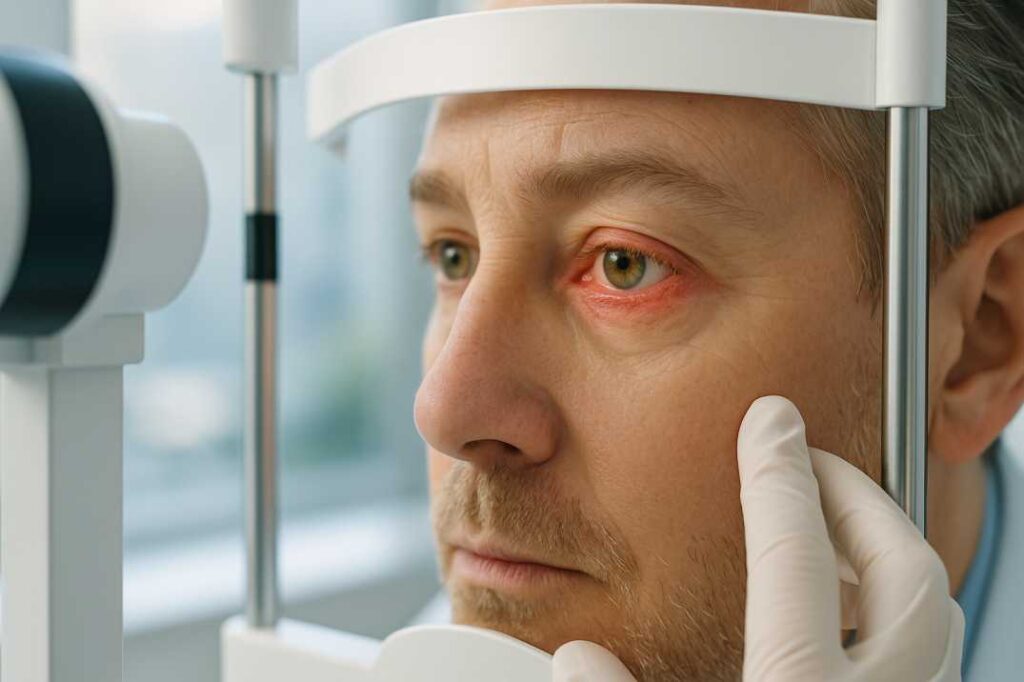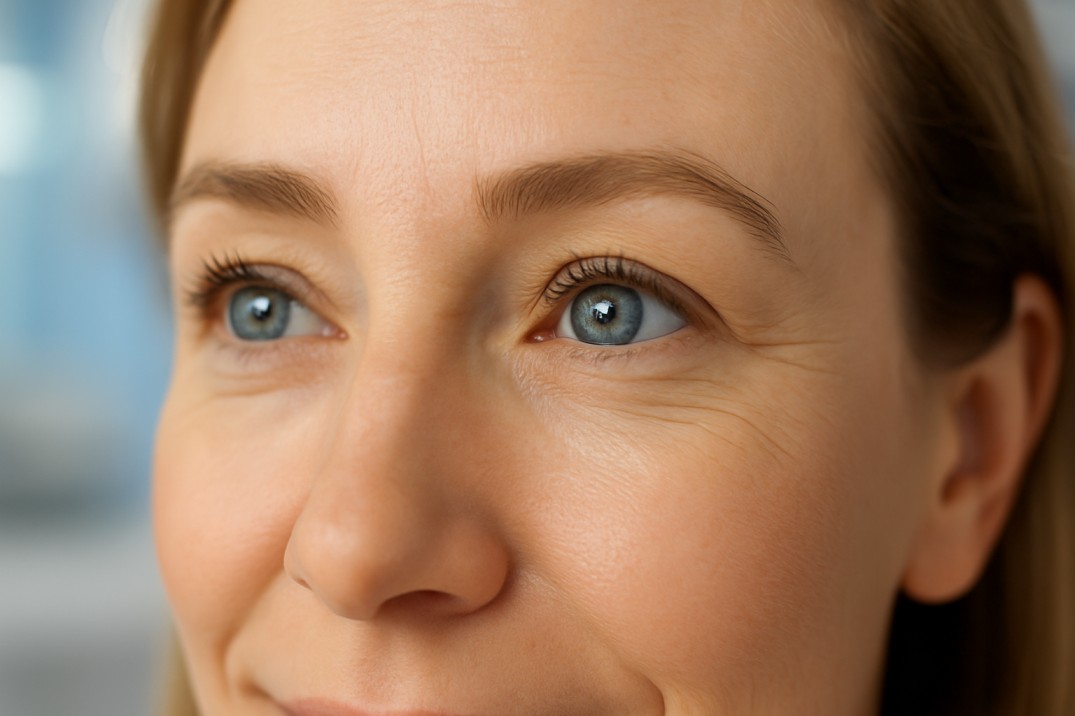Recognizing Blepharitis Symptoms: What Seattle Patients Report Most
Based on our extensive clinical experience at Cannon EyeCare in Seattle, patients typically report a combination of these symptoms:
Early-Stage Symptoms:
-
Crusty Debris: Noticeable buildup at the eyelash base, especially upon waking (“Seattle morning eye gunk”).
-
Red, Swollen Margins: Inflammation along the eyelid edges.
-
Burning or Stinging: Persistent discomfort in the eye area.
-
Gritty Sensation: Feeling like sand or dirt is trapped in your eyes.
-
Watery or Dry Eyes: Excessive tearing or unusual dryness, often worsened by Seattle’s damp springs or indoor heating.
Advanced Symptoms Needing Urgent Seattle Eye Care:
-
Eyelash Issues: Loss or abnormal growth of lashes – a top concern for Seattle patients.
-
Unrelenting Redness: Persistent eye redness despite home care.
-
Vision Changes: Blurriness or increased light sensitivity.
-
Recurrent Bumps: Frequent styes or chalazia (eyelid cysts).
-
Lens/Makeup Difficulty: Significant contact lens discomfort or trouble applying eye makeup.
What Causes Blepharitis? Key Factors Explained by Our Seattle Clinic
Understanding the root causes of blepharitis allows Cannon EyeCare in Seattle to create precise treatment plans. This complex condition typically involves multiple factors:
-
Bacterial Overgrowth
Staphylococcus bacteria naturally inhabit skin but can overpopulate eyelid margins, triggering inflammation. Seattle’s rainy climate and indoor humidity may promote bacterial growth during damp months.
-
Demodex Mites: The Hidden Culprit
Microscopic Demodex folliculorum mites in eyelash follicles cause significant inflammation when overpopulated. Breakthrough treatment exists: FDA-approved lotilaner (Xdemvy, 2024) specifically targets Demodex-related blepharitis.
-
Meibomian Gland Dysfunction (MGD)
Blocked or dysfunctional oil glands along the eyelids lead to evaporative dry eye and posterior blepharitis. Prevalent among Seattle’s tech professionals due to prolonged screen use, reducing blink rates.
-
Associated Skin & Health Conditions
-
Seborrheic dermatitis: Scalp/face flaking affecting eyelids
-
Ocular rosacea: Especially common in fair-skinned Northwesterners
-
Atopic dermatitis: Chronic inflammation triggering eyelid issues
Professional Blepharitis Diagnosis: When Seattle Patients Should Visit Cannon EyeCare
While mild eyelid irritation might tempt you to self-manage, professional diagnosis at our Seattle clinic prevents vision risks and tailors treatment. During your exam, we perform:
-
Comprehensive Eyelid Assessment
Using advanced slit lamp biomicroscopy, we analyze eyelid margins, lash follicles, and tear film quality to determine blepharitis type (anterior/posterior) and severity.
-
Demodex Mite Testing
Microscopic examination of eyelash samples confirms mite infestations – critical for prescribing breakthrough treatments like FDA-approved Xdemvy™ (lotilaner).
-
Meibomian Gland Evaluation
Gentle expression reveals gland blockages causing posterior blepharitis. We use meibography imaging to map gland health for Seattle patients with screen-heavy routines.
“Seattle’s damp climate amplifies underlying causes. Our diagnostic precision prevents misdiagnosis seen in urgent care settings.” – Cannon EyeCare Clinical Team
Visit Our Seattle Clinic If You Experience:
Proven Blepharitis Treatments: From Home Care to Advanced Seattle Clinic Solutions
Effective blepharitis management requires a personalized approach. Based on our success treating Seattle patients, here’s what delivers lasting results:
Essential Self-Care Routine
Daily eyelid hygiene is critical in Seattle’s allergen-prone environment:
-
Warm Compresses: 10-15 mins, 2x/day (use a clean washcloth; maintain consistent warmth)
-
Gentle Cleaning: Use hypochlorous acid solutions or diluted baby shampoo with cotton swabs along lash lines
-
Eyelid Massage: After compresses, apply light pressure to express blocked glands
Targeted Prescription Therapies
Breakthrough Treatment: Xdemvy™ (Lotilaner)
*FDA-approved in 2024 for Demodex blepharitis:*
-
81.3% symptom improvement in SATURN clinical trials
-
First prescription drop specifically targeting eyelash mites
-
Available at Cannon EyeCare, Seattle
Advanced In-Clinic Procedures
-
BlephEx™
Deep cleaning of eyelid margins to remove biofilm
-
Intense Pulsed Light (IPL)
Restores oil gland function – ideal for Seattle’s screen-heavy professionals
-
ZEST Treatment
Tea tree oil-based deep cleaning for stubborn Demodex cases

Living with Chronic Blepharitis: Seattle-Specific Management Strategies
Managing chronic blepharitis in Seattle requires adapting to our unique Pacific Northwest environment. At Cannon EyeCare, we recommend these localized strategies:
Adapting to Seattle’s Climate
-
Rainy Seasons: Combat indoor heating dryness with bedroom humidifiers (ideal: 40-60% humidity)
-
Allergy Peaks: Pre-treat before Seattle’s tree pollen (Feb-May) and grass pollen (May-July) surges
-
Cloudy Day Protection: Wear UV-blocking sunglasses daily – even when overcast
Makeup & Skincare Guidance
Safe practices for Seattle beauty routines:
- Use fragrance-free, hypoallergenic products (oil-free removers recommended)
- Replace mascara every 3 months (monthly during flares)
- Always remove makeup with hypochlorous acid sprays before bed
- Avoid waterproof formulas requiring harsh scrubbing
- Take 2-3 makeup-free days weekly when symptoms flare
Tech Worker Eye Protection
For Seattle’s screen-heavy workforce:
-
Practice the “20-20-20 rule“ hourly
-
Position monitors below eye level to reduce lid exposure
-
Use preservative-free artificial tears 4x/day
-
Consider blue light glasses with an anti-glare coating
When Blepharitis Complications Arise: Seattle Warning Signs
While most cases improve with treatment, Cannon EyeCare urges Seattle patients to recognize these urgent complications:
Seek Immediate Seattle Emergency Eye Care For:
- Corneal Involvement (ulcers/infections affecting vision)
- Persistent vision changes despite treatment
- Severe eyelash loss impacting appearance/function
- Secondary infections (increased pain/swelling)
Long-Term Risks Without Proper Management:
• Chronic dry eye syndrome requiring specialized care
• Permanent eyelash misdirection or loss
• Eyelid margin scarring blocking oil glands
At Cannon EyeCare, we’re committed to helping Seattle residents achieve comfortable, healthy vision through evidence-based blepharitis treatment. Don’t let chronic eyelid inflammation impact your quality of life – effective solutions are available.
Ready to start your journey toward healthier eyes? Contact Cannon EyeCare today to schedule your comprehensive blepharitis evaluation. Our Seattle team combines cutting-edge treatments with personalized care to help you see and feel your best.




